Apollonian
Guest Columnist
Trump: I thought Israelis would do anything for peace, but found that not to be true
In further quotes from new book, ex-president says Netanyahu ‘never’ wanted peace deal, calls Abbas a ‘father’ figure, claims he prevented annexation: ‘I got angry and stopped it’
Link: https://www.timesofisrael.com/trump...hing-for-peace-but-found-that-not-to-be-true/By TOI staff 11 December 2021, 10:46 pm Edit
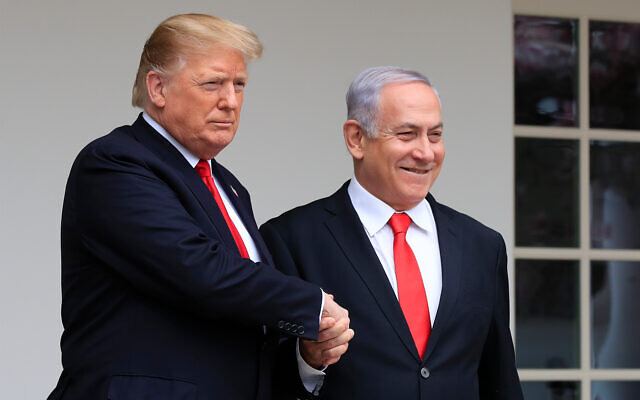
US president Donald Trump (left) welcomes visiting Prime Minister Benjamin Netanyahu to the White House in Washington, DC, on March 25, 2019. (AP Photo/Manuel Balce Ceneta, File)
In newly released interview excerpts Saturday, former United States president Donald Trump offered more startlingly frank views on Israel’s leadership during his time in office, a day after he was quoted in an astounding assault on ex-premier Benjamin Netanyahu.
In the latest taped comments broadcast by Channel 12, Trump said he believed Netanyahu “did not want to make peace. Never did”; claimed he prevented the Israeli leader from annexing West Bank land (“I got angry and I stopped it”); offered his favorable opinion on Defense Minister Benny Gantz (“I think [he] wanted to make a deal… if he won, I think it would be a lot easier”); and his evolving view on the Israel-Palestinian conflict (“I [had] thought the Palestinians were impossible, and the Israelis would do anything to make peace and a deal. I found that not to be true”).
Speaking to journalist Barak Ravid earlier this year for an upcoming book, the ex-president commented on his efforts to mediate between Jerusalem and Ramallah, and his feeling as time went on that Netanyahu wasn’t truly interested in reaching a settlement.
Trump said that when he came into office, he’d asked Netanyahu for overtures toward the Palestinians, raising the possibility of a construction freeze in the West Bank, but the Israeli leader often demurred.
“Bibi did not want to make a deal,” he said, using Netanyahu’s nickname. “Even most recently, when we came up with the maps” as part of his administration’s peace plan, Netanyahu’s reaction was “‘Oh this is good, good,’ everything was always great, but he was never… he did not want to make a deal.
“Now I don’t know if he didn’t want to make it for political reasons, or for other reasons. I wish he would have said he didn’t want to make a deal, instead of…. Because a lot of people devoted a lot of work. But I don’t think Bibi would have ever made a deal. That’s my opinion. I think the general [Gantz] wanted to make a deal.”
Trump said he believed that Palestinian Authority President Mahmoud Abbas “wanted to make a deal more than Netanyahu. And I will be honest, I had a great meeting with him, Abbas, right. I had a great meeting with him. And we spent a lot of time together, talking about many things. And it was almost like a father. I mean, he was so nice, couldn’t have been nicer.”
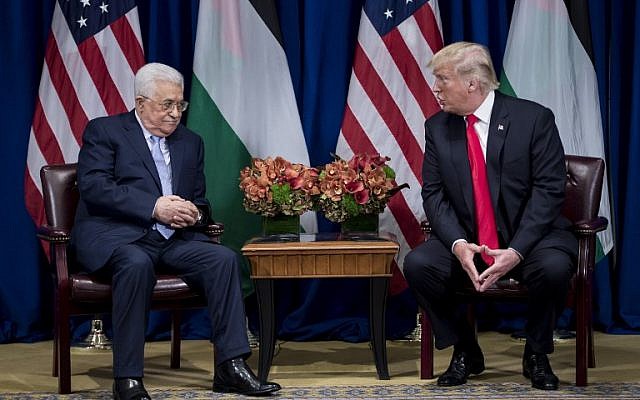
Palestinian Authority President Mahmoud Abbas listens while US President Donald Trump makes a statement for the press before a meeting at the Palace Hotel during the 72nd United Nations General Assembly, on September 20, 2017, in New York. (AFP/Brendan Smialowski)
Trump recalled he then told Netanyahu that “I had a very good meeting with Abbas. We can definitely do a deal.” The Israeli leader’s response? “‘Well, let’s think about it. Let’s not move too fast, you know.’ After he started talking, I said, wait a minute, you don’t want to make a deal.
“And he said, ‘Well, uh, uh, uh.’ And the fact is I don’t think Bibi ever wanted to make a deal.
“I [had] thought the Palestinians were impossible, and the Israelis would do anything to make peace and a deal. I found that not to be true.”تصريح مفاجئ من ترامب تجاه عباس: كان مثل الوالد!
(تسجيل صوتي خلال محادثة مع باراك رافيد، نشرتها القناة ١٢) pic.twitter.com/4FvfFhQKTx
— أحمد دراوشة (@AhDarawsha) December 11, 2021
Despite Trump’s frustration with Netanyahu, he went on to recognize Jerusalem as Israel’s capital and announce the relocation there of the American embassy, leading the Palestinians to break off ties with Washington.
“I don’t think Bibi ever wanted to make peace,” Trump repeated. “I think he just tapped us along… ‘No, no, we want to, we want to’… But I think Bibi did not want to make peace. Never did.”
Advertisement
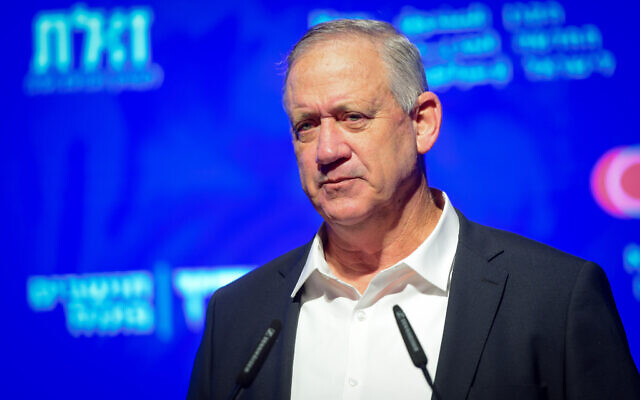
Defense Minister Benny Gantz speaks at Haaretz Democracy Conference in Jaffa, on November 9, 2021. (Avshalom Sassoni/Flash90)
Trump was far more positive in his comments on Benny Gantz, who in 2020 formed a power-sharing government with Netanyahu, and was supposed to take over from him as premier after a set period of time (the deal was never honored, the government collapsed, and new elections ousted Netanyahu from power).

Israeli journalist Barak Ravid (Twitter)
“So, Benny Gantz. I really like him a lot. I thought he was great. He came to the White House. He was someone that, in my opinion, it would have been much easier to make a deal with the Palestinians… The Palestinians hate Netanyahu. They hate him with a passion. They did not hate Gantz. They didn’t hate him.
“I liked the general a lot. In fact, I said to Jared [Kushner] and David [Friedman], that if he became the guy, if he won, I think it would be a lot easier,” Trump said, referring to his son-in-law and adviser and his ambassador to Israel, respectively.
When Trump announced his peace plan in January 2020, Netanyahu immediately claimed the administration had given its okay for Israel to annex major chunks of the West Bank containing Israeli settlements, to the jubilation of the Israeli right and alarm of the Palestinians and many international observers.
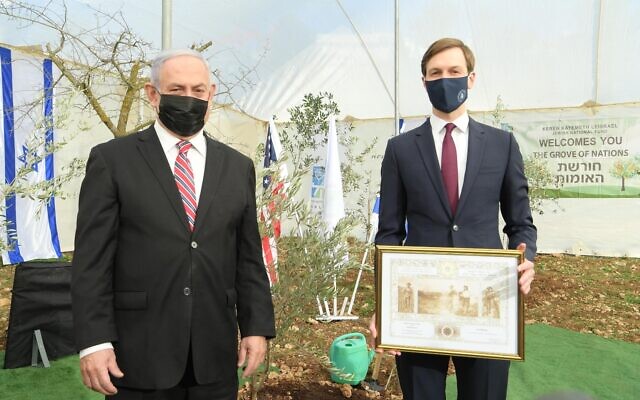
Then-prime minister Benjamin Netanyahu (left) and then-White House senior adviser Jared Kushner after planting an olive tree at the Jerusalem Grove of Nations, on December 21, 2020. (Amos Ben Gershom/GPO)
But Washington quickly expressed reservations, and as time went on it became apparent that the supposed greenlight had not, in fact, been given. Israel eventually abandoned the annexation plan as part of its deal to normalize relations with the United Arab Emirates and Bahrain later that year, under American auspices.
Trump, in the interview, said he had stopped the Israeli annexation plan himself.
“I got angry and I stopped it, because that was really going too far. That was going way too far, you know, when [Netanyahu] did the big ‘Let’s build. Let’s take everything and just start building on it.’ We were not happy about that.”
Trump also spoke of his popularity in Israel, one of the only countries in the world in which he had consistently favorable ratings.
“In Israel, I’m the most popular person… Who are the 20 percent [in Israel who don’t support me] that are so ungrateful? They are bad people.”
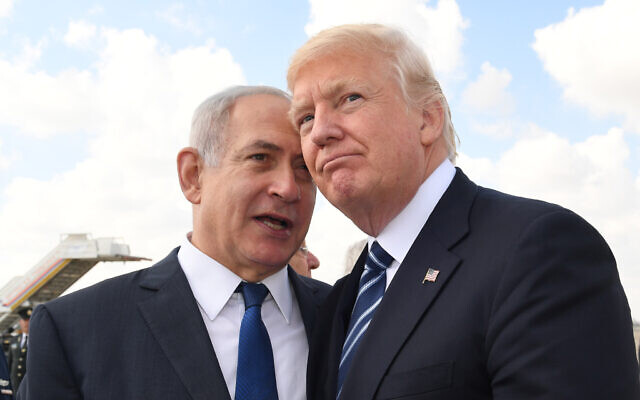
US President Donald Trump (right) with Israeli Prime Minister Benjamin Netanyahu prior to Trump’s departure to Rome at the Ben Gurion International Airport in Tel Aviv, on May 23, 2017. (Kobi Gideon/GPO via Flash90)
Trump spoke to Ravid in April and July for the reporter’s new Hebrew-language book, “Trump’s Peace,” about the Abraham Accords normalization deals between Israel and Arab states, which were brokered under the Trump administration.
Excerpts from the interviews were also released Friday by the Yedioth Ahronoth daily, and by Channel 12, ahead of the book’s release.
In excerpts released Friday, Trump assailed Netanyahu for ostensibly congratulating Joe Biden hours after he was declared winner of the 2020 election by all major news outlets.
“He was very early. Like earlier than most. I haven’t spoken to him since. F**k him,” Trump said.
“Nobody did more for Bibi. And I liked Bibi. I still like Bibi,” Trump said, referring to Netanyahu by his nickname. He was “the man that I did more for than any other person I dealt with.”
“But I also like loyalty. The first person to congratulate Biden was Bibi. And not only did he congratulate him, he did it on tape. And it was on tape.”
Netanyahu was actually quite late in congratulating Biden in November of last year, conspicuously doing so long hours after many other world leaders.
Trump said his decision to pull out of the 2015 nuclear deal with Iran — which the current administration is seeking to return to — was “because of my relations with Israel,” rather than out of personal ties to Netanyahu.
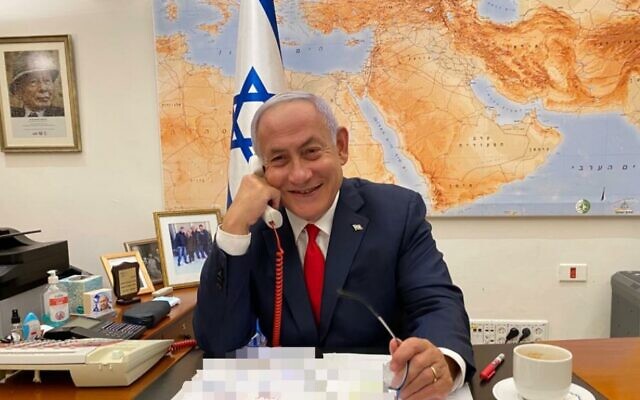
Then-prime minister Benjamin Netanyahu speaks to US President Joe Biden, on February 17, 2021. (Prime Minister’s Office)
And he claimed that had he not done so, “I think Israel would have been destroyed maybe by now.”
“Now Biden is going back to the deal because he has no clue. The Israelis fought this deal and Obama wouldn’t listen to them. The decision to back out of the deal was because of my relations with Israel — not with Bibi. Those were my feelings towards Israel.”
Trump also said he had saved Netanyahu in Israel’s April 2019 election by recognizing the Golan Heights as Israeli territory. That election was the first of four inconclusive national polls in two years of political chaos that lasted until Netanyahu was removed from power by the current government.
“Take the Golan for example,” said Trump. “That was a big deal. People say that was a $10 billion gift. I did it right before the election, which helped him a lot… he would have lost the election if it wasn’t for me. So he tied. He went up a lot after I did it. He went up 10 points or 15 points after I did Golan Heights.”
Trump’s statements in the interviews back up reporting by US journalist Michael Wolff, who wrote in his account of Trump’s presidency that he considered Netanyahu’s message to Biden the “ultimate betrayal.”
Trump raged to aides that Netanyahu congratulated Biden “before the ink was dry.” Wolff’s book, “Landslide: The Final Days of the Trump Presidency,” was published in July.

View of the blossoming almond trees in the Golan Heights, on February 11, 2019. (Maor Kinsbursky/Flash90)
Trump refused to concede defeat, making unsubstantiated allegations of serious fraud and vowing to take his case to the courts, actions that ultimately encouraged his followers to storm the US Capitol building in an attempt to stop the certification of Biden’s election victory.
Trump’s apparent anger came despite Netanyahu being one of the last major world leaders to congratulate Biden and Vice President Kamala Harris.
In response to the quotes, Netanyahu’s office on Friday said he “really appreciates” Trump’s backing for Israel, but “he also really appreciates the importance of the strong alliance between Israel and the US, and it was therefore important for him to congratulate the incoming president.”
read more: [see site link, above, top]
